道德推脱问卷(英文)
- 格式:doc
- 大小:26.00 KB
- 文档页数:1
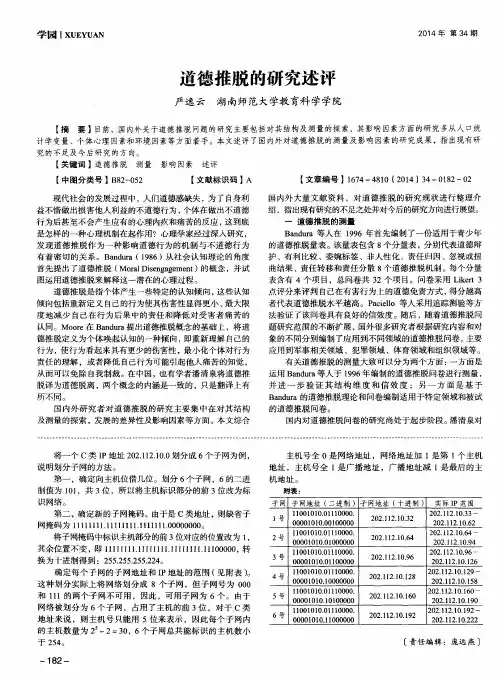
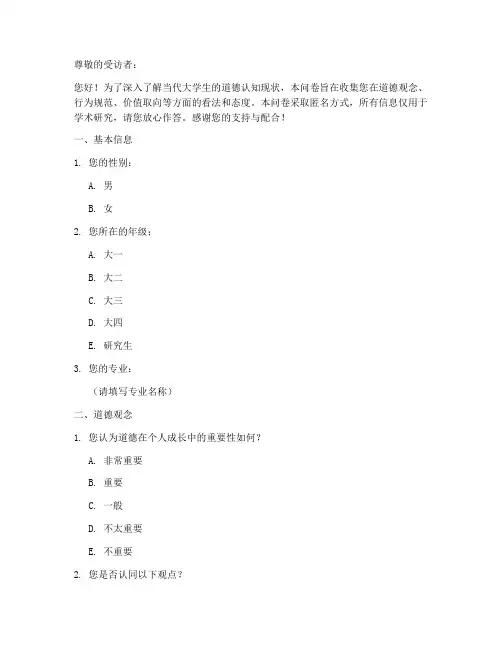
尊敬的受访者:您好!为了深入了解当代大学生的道德认知现状,本问卷旨在收集您在道德观念、行为规范、价值取向等方面的看法和态度。
本问卷采取匿名方式,所有信息仅用于学术研究,请您放心作答。
感谢您的支持与配合!一、基本信息1. 您的性别:A. 男B. 女2. 您所在的年级:A. 大一B. 大二C. 大三D. 大四E. 研究生3. 您的专业:(请填写专业名称)二、道德观念1. 您认为道德在个人成长中的重要性如何?A. 非常重要B. 重要C. 一般D. 不太重要E. 不重要2. 您是否认同以下观点?A. 道德规范是维护社会秩序的基石B. 道德规范是个人修养的体现C. 道德规范是促进人际关系和谐的纽带D. 以上都是E. 以上都不是3. 您认为以下哪些行为属于不道德?A. 考试作弊B. 拒绝帮助需要帮助的人C. 虚假宣传D. 侵犯他人隐私E. 以上都是F. 以上都不是三、行为规范1. 您是否经常遵守以下行为规范?A. 公共场合不大声喧哗B. 遵守交通规则C. 爱护公共设施D. 尊重他人意见E. 以上都是F. 以上都不是2. 您认为以下哪些行为属于违反社会公德?A. 在公共场所吸烟B. 随地乱扔垃圾C. 破坏公共设施D. 侵犯他人权益E. 以上都是F. 以上都不是3. 您认为以下哪些行为属于违反学术道德?A. 考试作弊B. 剽窃他人作品C. 虚假宣传D. 恶意诽谤他人E. 以上都是F. 以上都不是四、价值取向1. 您认为以下哪些价值观对个人成长更有益?A. 诚信B. 责任C. 团结D. 自强E. 以上都是F. 以上都不是2. 您认为以下哪些价值观对个人发展更有利?A. 务实B. 创新C. 竞争D. 合作E. 以上都是F. 以上都不是3. 您认为以下哪些价值观对个人品德修养更有帮助?A. 宽容B. 诚实C. 勇敢D. 自律E. 以上都是F. 以上都不是感谢您的参与!请您在填写问卷时,务必认真阅读每个问题,并根据您的实际情况选择最符合您的选项。
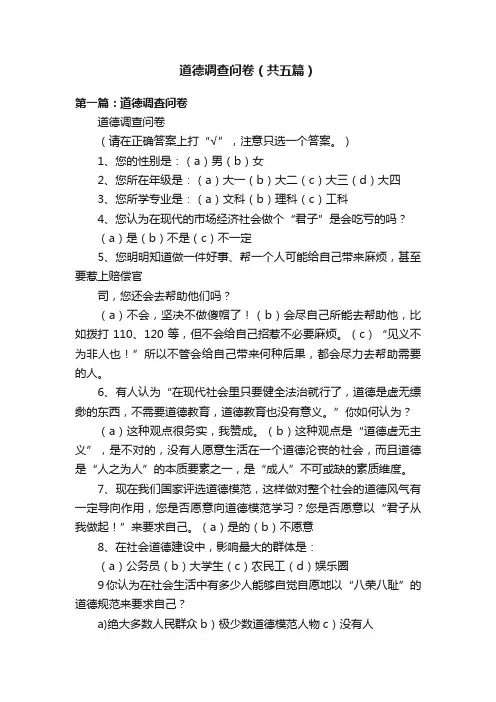
道德调查问卷(共五篇)第一篇:道德调查问卷道德调查问卷(请在正确答案上打“√”,注意只选一个答案。
)1、您的性别是:(a)男(b)女2、您所在年级是:(a)大一(b)大二(c)大三(d)大四3、您所学专业是:(a)文科(b)理科(c)工科4、您认为在现代的市场经济社会做个“君子”是会吃亏的吗?(a)是(b)不是(c)不一定5、您明明知道做一件好事、帮一个人可能给自己带来麻烦,甚至要惹上赔偿官司,您还会去帮助他们吗?(a)不会,坚决不做傻帽了!(b)会尽自己所能去帮助他,比如拨打110、120等,但不会给自己招惹不必要麻烦。
(c)“见义不为非人也!”所以不管会给自己带来何种后果,都会尽力去帮助需要的人。
6、有人认为“在现代社会里只要健全法治就行了,道德是虚无缥缈的东西,不需要道德教育,道德教育也没有意义。
”你如何认为?(a)这种观点很务实,我赞成。
(b)这种观点是“道德虚无主义”,是不对的,没有人愿意生活在一个道德沦丧的社会,而且道德是“人之为人”的本质要素之一,是“成人”不可或缺的素质维度。
7、现在我们国家评选道德模范,这样做对整个社会的道德风气有一定导向作用,您是否愿意向道德模范学习?您是否愿意以“君子从我做起!”来要求自己。
(a)是的(b)不愿意8、在社会道德建设中,影响最大的群体是:(a)公务员(b)大学生(c)农民工(d)娱乐圈9你认为在社会生活中有多少人能够自觉自愿地以“八荣八耻”的道德规范来要求自己?a)绝大多数人民群众b)极少数道德模范人物c)没有人10、你如何看待大学生恋爱中的同居现象?a)合情合理但不合法,大学生应该慎重;b)这是不道德的行为,应该禁止; c)只要秉承自愿、无伤的原则,就不应该干涉。
11、黑格尔说“一个人就是他的一串行为所构成的。
”因此,你如何看待自己的道德实践?a)要重视自己的行为选择,以“勿以善小而不为,勿以恶小而为之”的戒条要求自己。
b)要积极地以自己正面的道德实践来影响他人、影响社会,推动良好社会风尚的形成,绝不妄自菲薄。
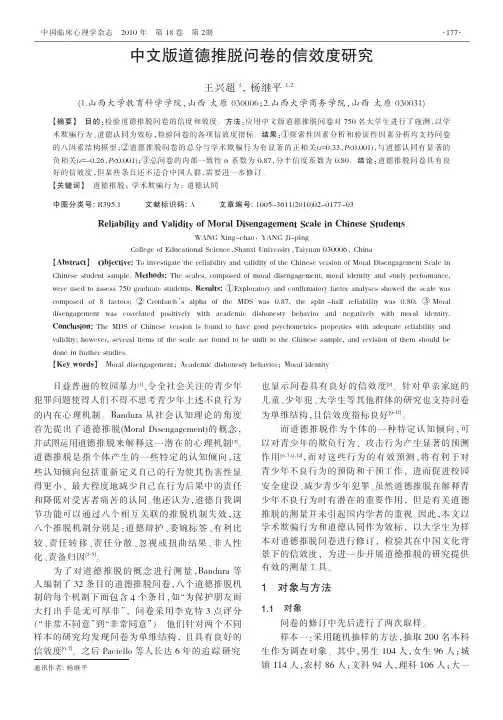
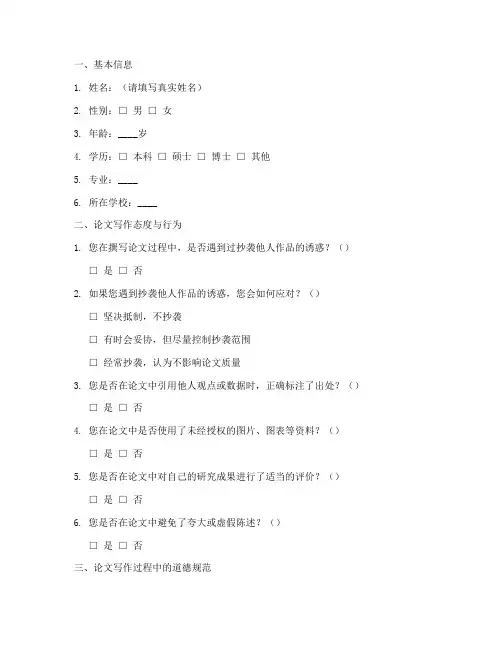
一、基本信息1. 姓名:(请填写真实姓名)2. 性别:□ 男□ 女3. 年龄:____岁4. 学历:□ 本科□ 硕士□ 博士□ 其他5. 专业:____6. 所在学校:____二、论文写作态度与行为1. 您在撰写论文过程中,是否遇到过抄袭他人作品的诱惑?()□ 是□ 否2. 如果您遇到抄袭他人作品的诱惑,您会如何应对?()□ 坚决抵制,不抄袭□ 有时会妥协,但尽量控制抄袭范围□ 经常抄袭,认为不影响论文质量3. 您是否在论文中引用他人观点或数据时,正确标注了出处?()□ 是□ 否4. 您在论文中是否使用了未经授权的图片、图表等资料?()□ 是□ 否5. 您是否在论文中对自己的研究成果进行了适当的评价?()□ 是□ 否6. 您是否在论文中避免了夸大或虚假陈述?()□ 是□ 否三、论文写作过程中的道德规范1. 您是否了解并遵守所在学校的学术道德规范?()□ 是□ 否2. 您是否在论文写作过程中,尊重他人的知识产权?()□ 是□ 否3. 您是否在论文中注明了导师的指导作用?()□ 是□ 否4. 您是否在论文中如实反映了实验过程和结果?()□ 是□ 否5. 您是否在论文中正确标注了数据来源?()□ 是□ 否6. 您是否在论文中遵循了正确的统计方法?()□ 是□ 否四、论文评审与修改1. 您在论文评审过程中,是否对抄袭、虚假陈述等问题进行了严格审查?()□ 是□ 否2. 您在论文修改过程中,是否要求作者对抄袭、虚假陈述等问题进行整改?()□ 是□ 否3. 您在论文评审过程中,是否对作者的学术道德进行了关注?()□ 是□ 否4. 您在论文评审过程中,是否对作者的研究方法、实验设计等方面进行了严格审查?()□ 是□ 否5. 您在论文评审过程中,是否对作者的论文进行了客观、公正的评价?()□ 是□ 否五、对学术道德的认识与建议1. 您认为学术道德在学术研究中的重要性如何?()□ 非常重要□ 重要□ 一般□ 不重要2. 您认为我国当前学术道德现状如何?()□ 很好□ 较好□ 一般□ 较差□ 很差3. 您认为应该如何加强学术道德建设?()(请在此处提出您的建议)感谢您参与本次问卷调查,您的宝贵意见将有助于我们更好地了解学术道德现状,为提高我国学术道德水平提供有益的参考。
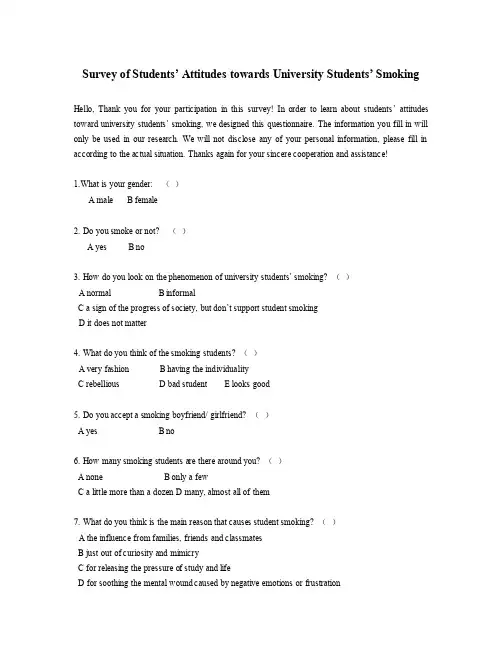
Survey of Students’ Attitudes towards University Students’ SmokingHello, Thank you for your participation in this survey! In order to learn about students’attitudes toward university students’ smoking, we designed this questionnaire. The information you fill in will only be used in our research. We will not disclose any of your personal information, please fill in according to the actual situation. Thanks again for your sincere cooperation and assistance!1.What is your gender: ()A maleB female2. Do you smoke or not? ()A yesB no3. How do you look on the phenomenon of university students’ smoking? ()A normalB informalC a sign of the progress of s ociety, but don’t support student smokingD it does not matter4. What do you think of the smoking students? ()A very fashionB having the individualityC rebelliousD bad studentE looks good5. Do you accept a smoking boyfriend/ girlfriend? ()A yesB no6. How many smoking students are there around you? ()A noneB only a fewC a little more than a dozenD many, almost all of them7. What do you think is the main reason that causes student smoking?()A the influence from families, friends and classmatesB just out of curiosity and mimicryC for releasing the pressure of study and lifeD for soothing the mental wound caused by negative emotions or frustrationE just filling the boring hoursF for refreshingG thinks it stylish, coolH the others ________8. Which of the following disadvantages of smoking do you think has the most bad influence on university students?()A harmful to healthB affect other peopleC giving a bad impression to the othersD waste of moneyE the other _______9. Which of the following harms of smoking do you know?()A The effect that cause cancerB Smoking is main risk factors of heart, cerebrovascular diseasesC osteoporosisD Smoking is chronic bronchitis, emphysema and chronic airway obstruction is one of the main causesE The harm of smoking on women more than the menF Passive smoking10. After understanding the great harm of smoking on our body, your attitude towards smoking of university students is: ()A normalB it dependsC objectD it does not matterRespondents: The students of Wuhan University of Technology Huaxia CollegeSample number :5Effective recovery:5Report on Students’ Attitudes towards University Students’ SmokingIntroductionThe aim of this report is to Survey the status of college smoking students, and to investigate their view of the smoking students, and to the understanding of the smokeFindingsThe phenomenon of university students smoking is very common.As is known to all that the harm of smoking on women more than the men. Even so, there are some female college students smoking. Surprisingly, many university students still smoking even they know the harms of smoking. Many university students think of the smoking students very fashion.We also found that the college has some management loose in students smoking. We have to say that the signs of “NO SMOKING” hanging on the wall are so weakness to the smoking students.At last, cigarette butts were thrown away here and there, it not only pollute our public places and also cause the danger of fire hazardRecommendations1. No smoking in teaching place2. Strengthen propaganda the harm of smoking3. The college must strengthen the management of smoking in public place。
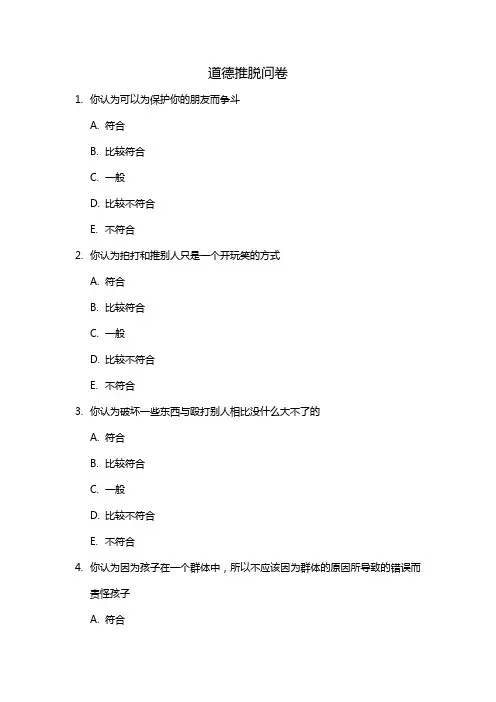
道德推脱问卷1.你认为可以为保护你的朋友而争斗A.符合B.比较符合C.一般D.比较不符合E.不符合2.你认为拍打和推别人只是一个开玩笑的方式A.符合B.比较符合C.一般D.比较不符合E.不符合3.你认为破坏一些东西与殴打别人相比没什么大不了的A.符合B.比较符合C.一般D.比较不符合E.不符合4.你认为因为孩子在一个群体中,所以不应该因为群体的原因所导致的错误而责怪孩子A.符合B.比较符合C.一般D.比较不符合E.不符合5.你认为如果孩子生活在恶劣条件下,那么人们就不能责怪他们表现出侵略性A.符合B.比较符合C.一般D.比较不符合E.不符合6.你认为可以说些小慌,因为小谎不会造成任何伤害A.符合B.比较符合C.一般D.比较不符合E.不符合7.你认为有些人应该像动物一样被对待A.符合B.比较符合C.一般D.比较不符合E.不符合8.你认为孩子在学校打架并一旦表现不好是老师的错误A.符合B.比较符合C.一般D.比较不符合E.不符合9.你认为可以殴打说你家庭坏话的人A.符合B.比较符合C.一般D.比较不符合E.不符合10.你认为殴打令人讨厌的同学只是为了给他们一个教训A.符合B.比较符合C.一般D.比较不符合E.不符合11.你认为偷一点儿钱和偷很多钱相比是不太严重的事情A.符合B.比较符合C.一般D.比较不符合E.不符合12.你认为如果一件破坏规矩的事情是被一个孩子提出来的,但却被另一些孩子做了,那么不应该责怪这个提出建议的孩子A.符合B.比较符合C.一般D.比较不符合E.不符合13.你认为如果孩子不遵守纪律,不应该归咎于他们行为不端A.符合B.比较符合C.一般D.比较不符合E.不符合14.你认为孩子们不介意被恶作剧,因为孩子认为这展示了别人对他们很感兴趣A.符合B.比较符合C.一般D.比较不符合E.不符合15.你认为可以用不好的态度对待一些表现得像一只“蠕虫”的人A.符合B.比较符合C.一般D.比较不符合E.不符合16.你认为如果人们因为粗心把东西忘在了某处,而导致这个东西被偷走了,那么这是那些人自己的错A.符合B.比较符合C.一般D.比较不符合E.不符合17.你认为可以因为集体荣誉受到侵害与人争斗A.符合B.比较符合C.一般D.比较不符合E.不符合18.你认为不经过允许骑走别人的自行车只是借A.符合B.比较符合C.一般D.比较不符合E.不符合19.你认为如果一些孩子共同決定要做有伤害性的事情,那么单独指责任何一个孩子都是不公平的A.符合B.比较符合C.一般D.比较不符合E.不符合20.你认为因为殴打同学是更糟糕的事,所以可以去侮辱同学A.符合B.比较符合C.一般D.比较不符合E.不符合。
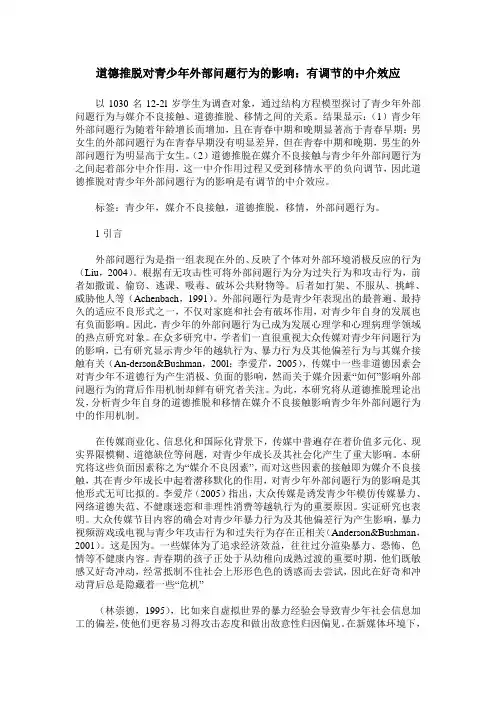
道德推脱对青少年外部问题行为的影响:有调节的中介效应以1030名12-2l岁学生为调查对象,通过结构方程模型探讨了青少年外部问题行为与媒介不良接触、道德推脱、移情之间的关系。
结果显示:(1)青少年外部问题行为随着年龄增长而增加,且在青春中期和晚期显著高于青春早期:男女生的外部问题行为在青春早期没有明显差异,但在青春中期和晚期,男生的外部问题行为明显高于女生。
(2)道德推脱在媒介不良接触与青少年外部问题行为之间起着部分中介作用,这一中介作用过程又受到移情水平的负向调节,因此道德推脱对青少年外部问题行为的影响是有调节的中介效应。
标签:青少年,媒介不良接触,道德推脱,移情,外部问题行为。
1引言外部问题行为是指一组表现在外的、反映了个体对外部环境消极反应的行为(Liu,2004)。
根据有无攻击性可将外部问题行为分为过失行为和攻击行为,前者如撒谎、偷窃、逃课、吸毒、破坏公共财物等。
后者如打架、不服从、挑衅、威胁他人等(Achenbach,1991)。
外部问题行为是青少年表现出的最普遍、最持久的适应不良形式之一,不仅对家庭和社会有破坏作用,对青少年自身的发展也有负面影响。
因此,青少年的外部问题行为已成为发展心理学和心理病理学领域的热点研究对象。
在众多研究中,学者们一直很重视大众传媒对青少年问题行为的影响,已有研究显示青少年的越轨行为、暴力行为及其他偏差行为与其媒介接触有关(An-derson&Bushman,200l;李爱芹,2005),传媒中一些非道德因素会对青少年不道德行为产生消极、负面的影响,然而关于媒介因素“如何”影响外部问题行为的背后作用机制却鲜有研究者关注。
为此,本研究将从道德推脱理论出发,分析青少年自身的道德推脱和移情在媒介不良接触影响青少年外部问题行为中的作用机制。
在传媒商业化、信息化和国际化背景下,传媒中普遍存在着价值多元化、现实界限模糊、道德缺位等问题,对青少年成长及其社会化产生了重大影响。
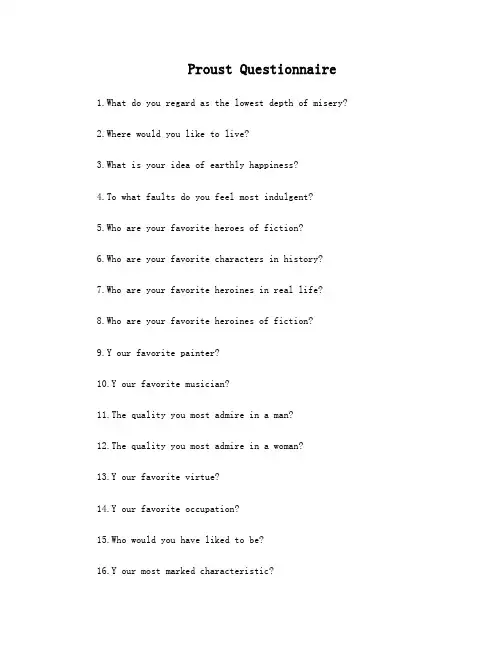
Proust Questionnaire1.What do you regard as the lowest depth of misery?2.Where would you like to live?3.What is your idea of earthly happiness?4.To what faults do you feel most indulgent?5.Who are your favorite heroes of fiction?6.Who are your favorite characters in history?7.Who are your favorite heroines in real life?8.Who are your favorite heroines of fiction?9.Y our favorite painter?10.Y our favorite musician?11.The quality you most admire in a man?12.The quality you most admire in a woman?13.Y our favorite virtue?14.Y our favorite occupation?15.Who would you have liked to be?16.Y our most marked characteristic?17.What do you most value in your friends?18.What is your principle defect?19.What is your favorite occupation?20.What is your dream of happiness?21.What to your mind would be the greatest of misfortunes?22.What would you like to be?23.What is your favorite color?24.What is your favorite flower?25.What is your favorite bird?26.Who are your favorite prose writers?27.Who are your favoite poets?28.Who are your favorite composers?29.Who are your heroes in real life?30.What are your favorite names?31.What is it you most dislike?32.What historical figures do you most despise?33.What event in military history do you most admire?34.What reform do you most admire?35.What natural gift would you most like to possess?36.How would you like to die?37.What is your present state of mind?38.What is your motto?The Infamous Proust QuestionnaireIn the back pages of V anity Fair each month, readers find The ProustQuestionnaire, a series of questions posed to famous subjects about their lives, thoughts, values and experience.The young Marcel was asked to fill out questionnaires at two social events: one when he was 13, another when he was 20. Proust did not invent this party game; he is simply the most extraordinary person to respond to them. At the birthday party of Antoinette Felix-Faure, the13-year-old Marcel was asked to answer the following questions in the birthday book, and here's what he said:What do you regard as the lowest depth of misery?To be separated from MamaWhere would you like to live?In the country of the Ideal, or, rather, of my idealWhat is your idea of earthly happiness?To live in contact with those I love, with the beauties of nature, with a quantity of books and music, and to have, within easy distance, a French theaterTo what faults do you feel most indulgent?To a life deprived of the works of geniusWho are your favorite heroes of fiction?Those of romance and poetry, those who are the expression of an ideal rather than an imitation of the realWho are your favorite characters in history?A mixture of Socrates, Pericles, Mahomet, Pliny the Y ounger and Augustin ThierryWho are your favorite heroines in real life?A woman of genius leading an ordinary lifeWho are your favorite heroines of fiction?Those who are more than women without ceasing to be womanly; everything that is tender, poetic, pure and in every way beautifulY our favorite painter?MeissonierY our favorite musician?MozartThe quality you most admire in a man?Intelligence, moral senseThe quality you most admire in a woman?Gentleness, naturalness, intelligenceY our favorite virtue?All virtues that are not limited to a sect: the universal virtuesY our favorite occupation?Reading, dreaming, and writing verseWho would you have liked to be?Since the question does not arise, I prefer not to answer it. Allthe same, I should very much have liked to be Pliny the Y ounger.Seven years after the first questionnaire, Proust was asked, at another social event, to fill out another; the questions are much the same, but the answers somewhat different, indicative of his traits at 20:Y our most marked characteristic?A craving to be loved, or, to be more precise, to be caressed and spoiled rather than to be admiredThe quality you most like in a man?Feminine charmThe quality you most like in a woman?A man's virtues, and frankness in friendshipWhat do you most value in your friends?Tenderness - provided they possess a physical charm which makes their tenderness worth havingWhat is your principle defect?Lack of understanding; weakness of willWhat is your favorite occupation?LovingWhat is your dream of happiness?Not, I fear, a very elevated one. I really haven't the courage to say what it is, and if I did I should probably destroy it by the mere fact of putting it。
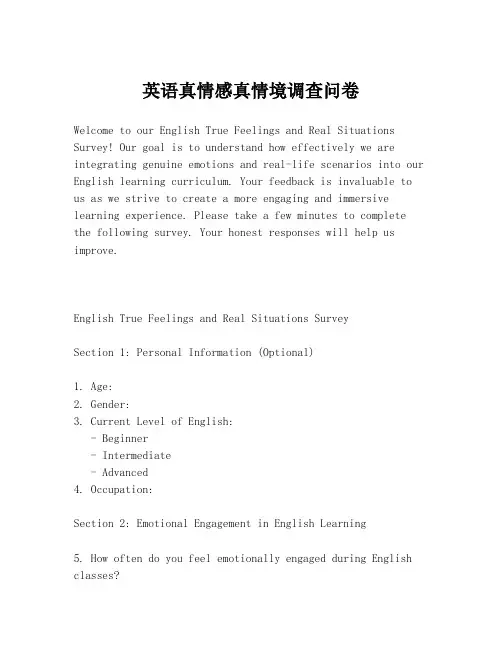
英语真情感真情境调查问卷Welcome to our English True Feelings and Real Situations Survey! Our goal is to understand how effectively we are integrating genuine emotions and real-life scenarios into our English learning curriculum. Your feedback is invaluable to us as we strive to create a more engaging and immersive learning experience. Please take a few minutes to complete the following survey. Your honest responses will help us improve.English True Feelings and Real Situations SurveySection 1: Personal Information (Optional)1. Age:2. Gender:3. Current Level of English:- Beginner- Intermediate- Advanced4. Occupation:Section 2: Emotional Engagement in English Learning5. How often do you feel emotionally engaged during English classes?- Often- Sometimes- Rarely- Never6. What type of content do you find most emotionally engaging? - Personal stories- Cultural narratives- Humor- Current events- Other (please specify)7. Have you ever felt that the emotional content in English classes was inappropriate or offensive?- Yes- No8. How important is it for you to have emotionally authentic interactions in English learning?- Very important- Somewhat important- Neutral- Not very important- Not important at allSection 3: Real-Life Scenarios in English Learning9. How frequently are real-life scenarios used in yourEnglish classes?- Always- Sometimes- Rarely- Never10. Which of the following real-life scenarios do you find most beneficial for learning English?- Travel and tourism- Workplace and professional interactions- Social and casual conversations- Problem-solving and critical thinking- Other (please specify)11. Do you feel that the scenarios presented are realistic and applicable to your life outside of class?- Yes, very realistic- Somewhat realistic- Neutral- Not very realistic- Not realistic at all12. What types of real-life scenarios would you like to see more of in your English learning?Section 4: Suggestions and Feedback13. What can we do to improve the emotional and real-life content in our English classes?14. Have you had any particularly memorable or impactful moments in English classes that involved true feelings orreal situations?15. Would you like to share any additional comments or suggestions?Section 5: Consent and Submission16. By submitting this survey, you consent to your responses being used for educational research and curriculum development purposes.Thank you for your participation!Please click "Submit" to complete the survey. Your feedback will help us enhance our teaching methods and provide a more meaningful English learning experience for all students.。
Mechanisms of Moral Disengagement(道德推脱)
1. It is alright to fight to protect your friends.
2. Slapping and shoving someone is just a way of joking.
3. Damaging some property is no big deal when you consider that others are beating
people up.
4. A kid in a gang should not be blamed for the trouble the gang causes.
5. If kids are living under bad conditions they cannot be blamed for behaving
aggresively.
6. It is okay to tell small lies because they don't really do any harm.
7. Some people deserve to be treated like animals.
8. If kids fight and misbehave in school it is their teacher's fault.、
9. It is alright to beat someone who bad mouths your family.
10. To hit obnoxious classmates is just giving them "a lesson."、
11. Stealing some money is not too serious compared to those who steal a lot of
money.
12. A kid who only suggests breaking rules should not be blamed if other kids go
ahead and do it.
13. If kids are not disciplined they should not be blamed for misbehaving.
14. Children do not mind being teased because it shows interest in them.
15. It is okay to treat badly somebody who behaved like a "worm."
16. If people are careless where they leave their things it is their own fault if they get
stolen.
17. It is alright to fight when your group's honour is threatened.
18. Taking someone's bicycle without their permission is just "borrowing it."
19. It is okay to insult a classmate because beating him/her is worse.
20. If a group decides together to do something harmful it is unfair to blame any kid
in the group for it.
21. Kids cannot be blamed for using bad words when all their friends do it.
22. Teasing someone does not really hurt them.
23. Someone who is obnoxious does not deserve to be treated like a human being.
24. Kids who get mistreated usually do things that deserve it.
25. It is alright to lie to keep your friends out of trouble.
26. It is not a bad thing to "get high" once in a while.
27. Compared to the illegal things people do, taking some things from a store without
paying for them is not very serious.
28. It is unfair to blame a child who had only a small part in the harm caused by a
group.
29. Kids cannot be blamed for misbehaving if their friends pressured them to do it.
30. Insults among children do not hurt anyone.
31. Some people have to be treated roughly because they lack feelings that can be hurt.
32. Children are not at fault for misbehaving if their parents force them too much.